Understanding the Evolving Role of Nurse Practitioners in Geriatric Mental Health
The increasing aging population worldwide demands innovative approaches to healthcare delivery, particularly in mental health services tailored for older adults. Nurse practitioners (NPs), with their advanced training and holistic approach, have become pivotal in bridging gaps within geriatric mental health care. This article explores their multifaceted roles, responsibilities, contributions, and the challenges they face in delivering comprehensive mental health services for seniors.
Defining the Scope and Responsibilities of Geriatric Nurse Practitioners
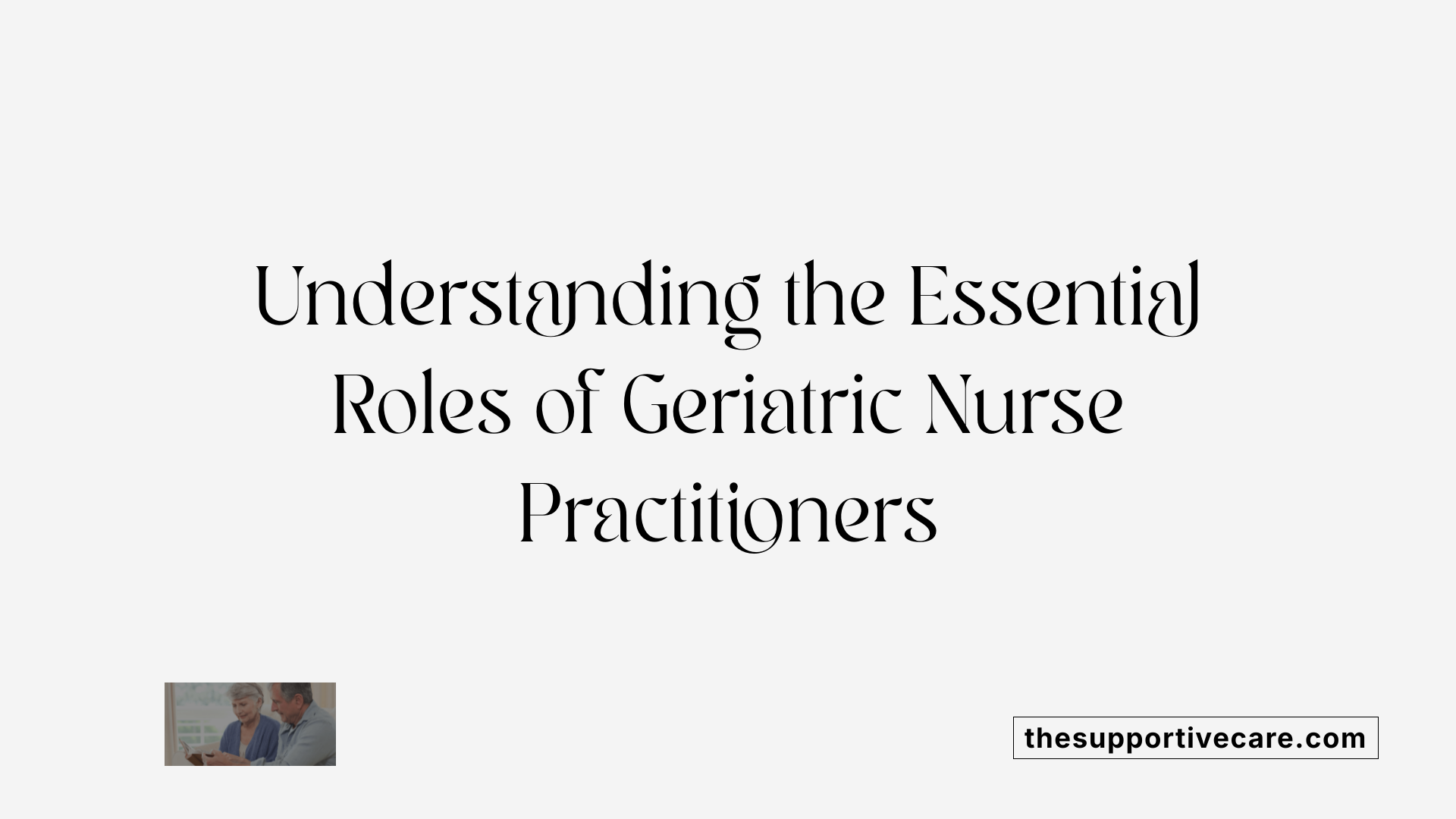
What are the responsibilities and scope of practice of nurse practitioners in geriatric mental health care?
Geriatric nurse practitioners (GNPs) play a crucial role in managing the mental health needs of older adults. Their responsibilities include conducting thorough assessments of mental health, identifying issues such as depression, dementia, or anxiety, and formulating tailored treatment plans. They are empowered to prescribe medications, order and interpret diagnostic tests, and collaborate with other healthcare providers to ensure comprehensive care.
GNPs also provide mental health counseling, educate seniors and their families about mental well-being, and advocate for their patients’ needs. By performing these roles, they help improve mental health outcomes and quality of life for older adults. This scope of practice often allows GNPs to operate with a significant degree of independence while working within interdisciplinary teams to optimize patient care.
Their holistic approach considers not only physiological factors but also social and environmental influences on mental health, making them vital in delivering personalized and continuous mental health support to seniors.
Contributions to Mental Health Management in Older Adults
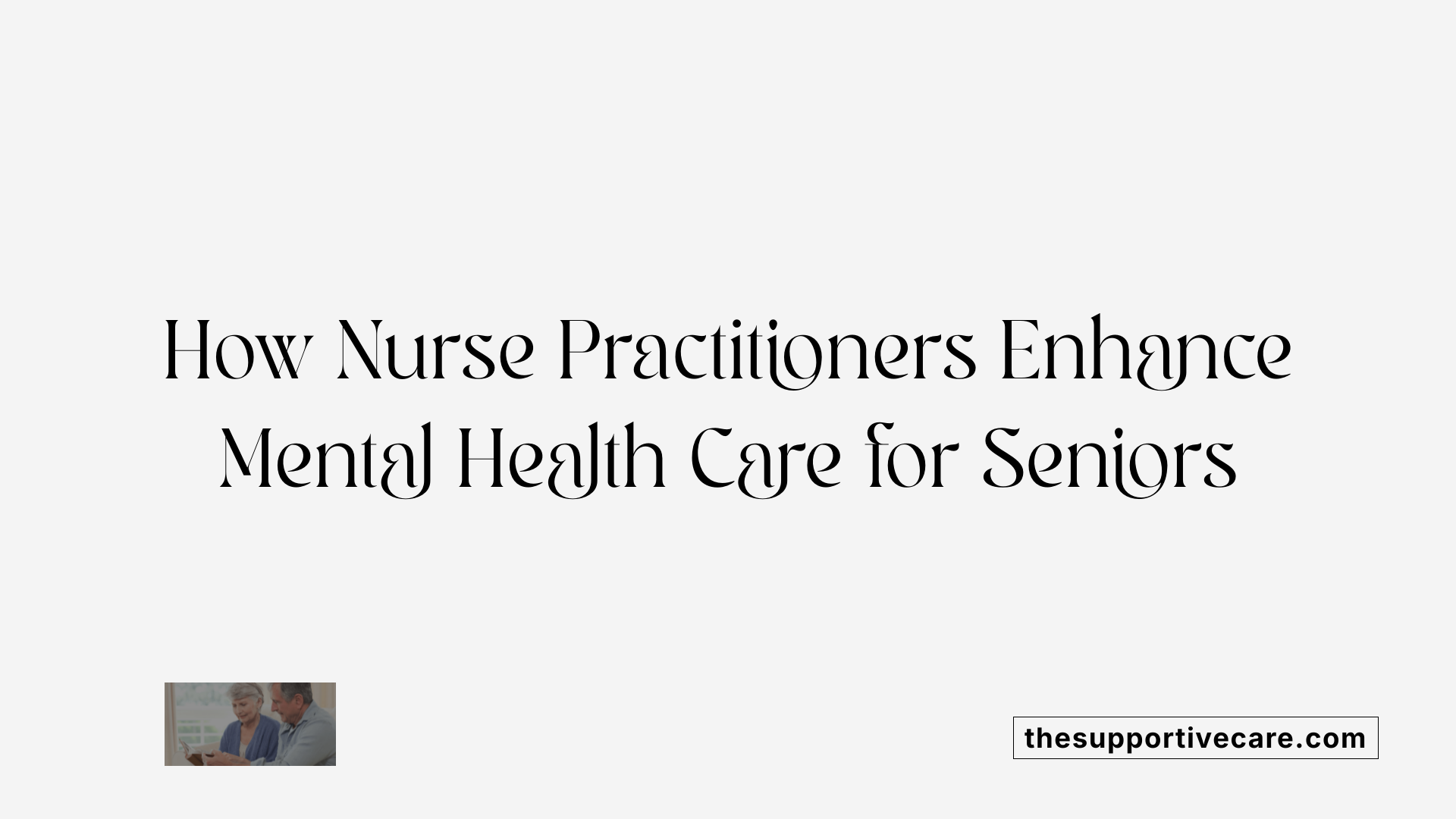
How do nurse practitioners contribute to mental health management in elderly populations?
Nurse practitioners play a critical role in improving mental health services for seniors by offering accessible, comprehensive care that addresses both mental and physical well-being. Their ability to conduct timely assessments allows for early detection of common issues among older adults, such as depression, dementia, and cognitive decline.
In clinical settings, NPs routinely screen for mental health conditions, utilize evidence-based diagnostic tools, and develop tailored treatment plans. Their role extends beyond diagnosis to the ongoing management of mental health conditions, including counseling, medication management, and coordination with specialists.
One significant advantage of nurse practitioners in senior care is their capacity to deliver services directly in the home environment. This approach reduces barriers for seniors facing mobility challenges or transportation issues, ensuring consistent follow-up and support. Home visits foster a trusting relationship, which encourages open communication about mental health concerns.
NPs actively engage both patients and their families by providing education on mental health conditions, treatment options, and lifestyle changes. Motivational interviewing techniques help motivate seniors to participate actively in their own care, leading to better adherence and improved outcomes.
Moreover, nurse practitioners incorporate evidence-based interventions such as cognitive-behavioral therapy principles and health promotion strategies. They collaborate with interdisciplinary teams to optimize mental health management, ensuring a holistic approach that considers social factors, physical health, and environmental influences.
Overall, NPs significantly enhance the mental health support system for older adults through early identification, ongoing management, patient and family engagement, and the application of best practice techniques, ultimately improving quality of life and reducing the burden of mental health conditions in aging populations.
Training, Certifications, and Qualifications for Geriatric Mental Health NPs
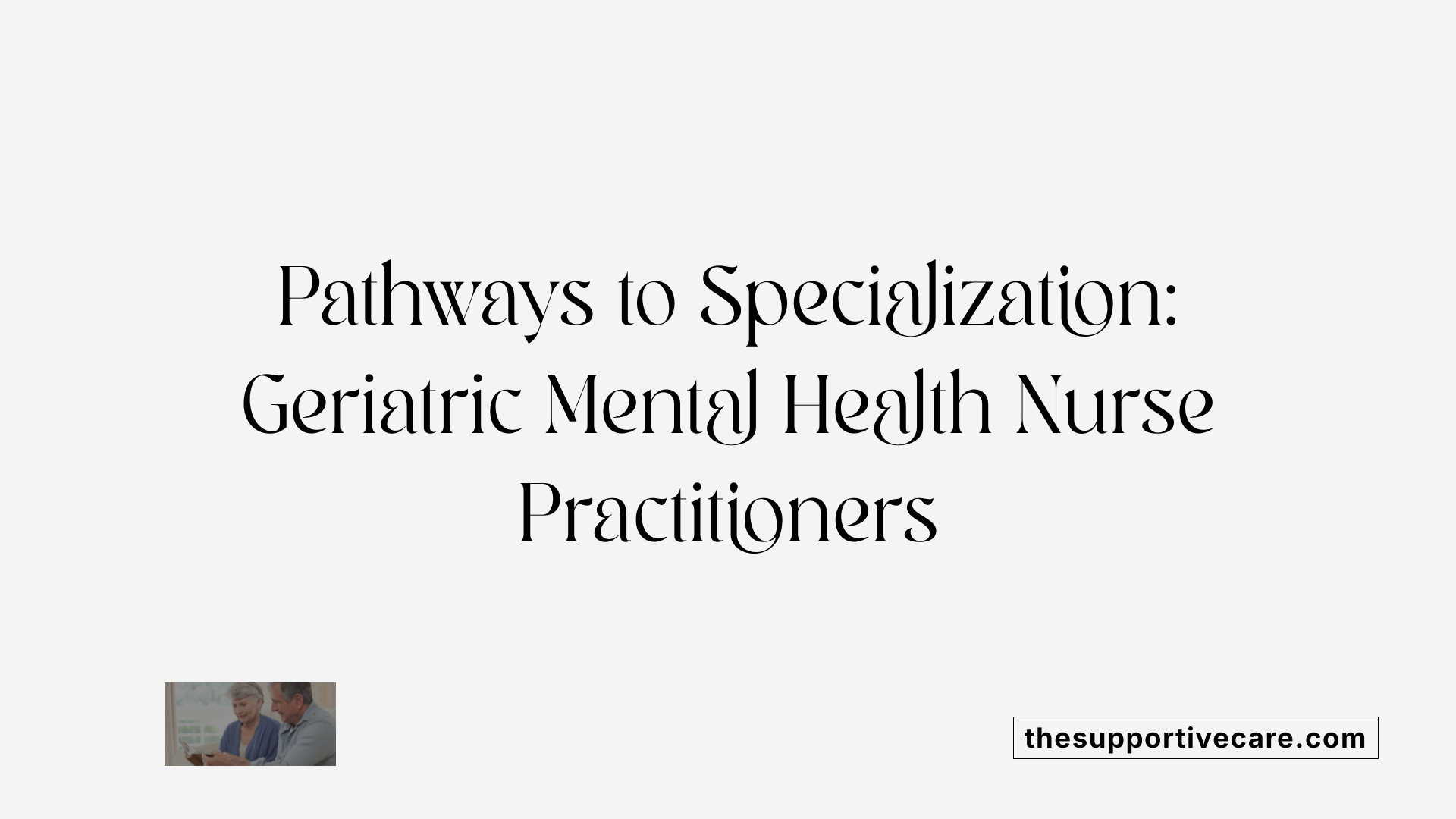
What training, education, and qualifications are required for nurse practitioners specializing in geriatrics and mental health?
Nurse practitioners (NPs) aiming to focus on geriatrics and mental health must follow a structured educational pathway. Initially, they need to earn a Bachelor of Science in Nursing (BSN) degree, which provides foundational nursing knowledge and clinical skills. After completing their undergraduate degree, they must obtain licensure as Registered Nurses (RNs).
To specialize further, aspiring geriatric or psychiatric mental health nurse practitioners pursue graduate education, typically a Master’s of Science in Nursing (MSN) or a Doctor of Nursing Practice (DNP). These programs offer advanced coursework and clinical training in areas like geriatrics or mental health, including evaluations of cognitive and emotional well-being.
Certification plays a crucial role in demonstrating expertise. Bodies such as the American Nurses Credentialing Center (ANCC) provide certification exams for geriatric, psychiatric mental health, or dual specialties. Securing certification requires completing supervised clinical hours, passing rigorous exams, and maintaining high standards of competency.
In addition to formal education, online certifications in special topics, such as neuropsychiatry or aging population management, allow NPs to deepen their practice and stay current with scientific advances. Ongoing education is essential; NPs must participate in continuous professional development, recertify periodically, and adhere to evolving clinical guidelines.
Legal and regulatory frameworks vary by region but generally require NPs to hold current licensure, complete designated clinical hours, and meet specific scope of practice standards established by health authorities. These credentials ensure that geriatric mental health NPs are qualified to provide safe, comprehensive, and effective care to older adults.
Impact of Nurse Practitioners on Geriatric Mental Health Service Delivery
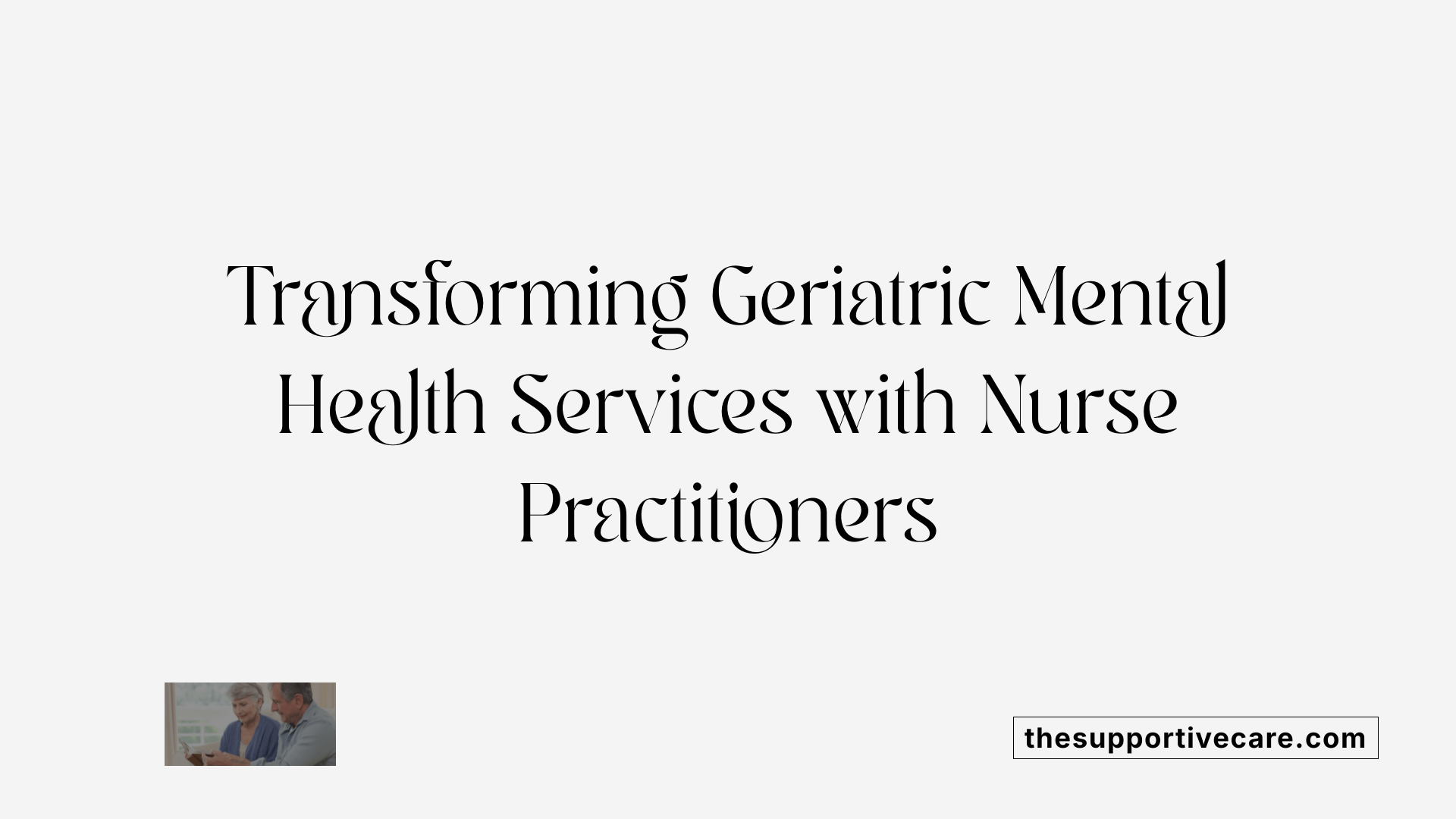
What is the impact of nurse practitioners on geriatric mental health service delivery?
Nurse practitioners (NPs) play a crucial role in transforming mental health services for older adults. Their presence in primary care and community settings greatly enhances access to mental health support, especially in underserved and rural areas where specialist resources may be scarce.
With advanced training in assessment and management, NPs are well-equipped to screen for mental health issues such as depression, anxiety, and cognitive decline during routine visits. This early detection leads to timely interventions, potentially preventing the deterioration of mental health and reducing the need for hospitalizations.
The proactive management by NPs not only improves clinical outcomes but also helps cut healthcare costs by decreasing emergency visits and inpatient stays. Their holistic approach addresses both psychological and social factors, ensuring comprehensive care.
Furthermore, NPs support family members and caregivers by providing education, emotional support, and guidance. This involvement reduces caregiver burden, empowers families, and encourages active participation in the care process.
Their leadership in integrated care models fosters collaboration among healthcare providers, ensuring continuity and coordination of mental health services. Overall, NPs contribute to better health outcomes, increased patient satisfaction, and a more accessible and effective mental health care system for the elderly.
Challenges, Risks, and Best Practices in Geriatric Mental Health Care
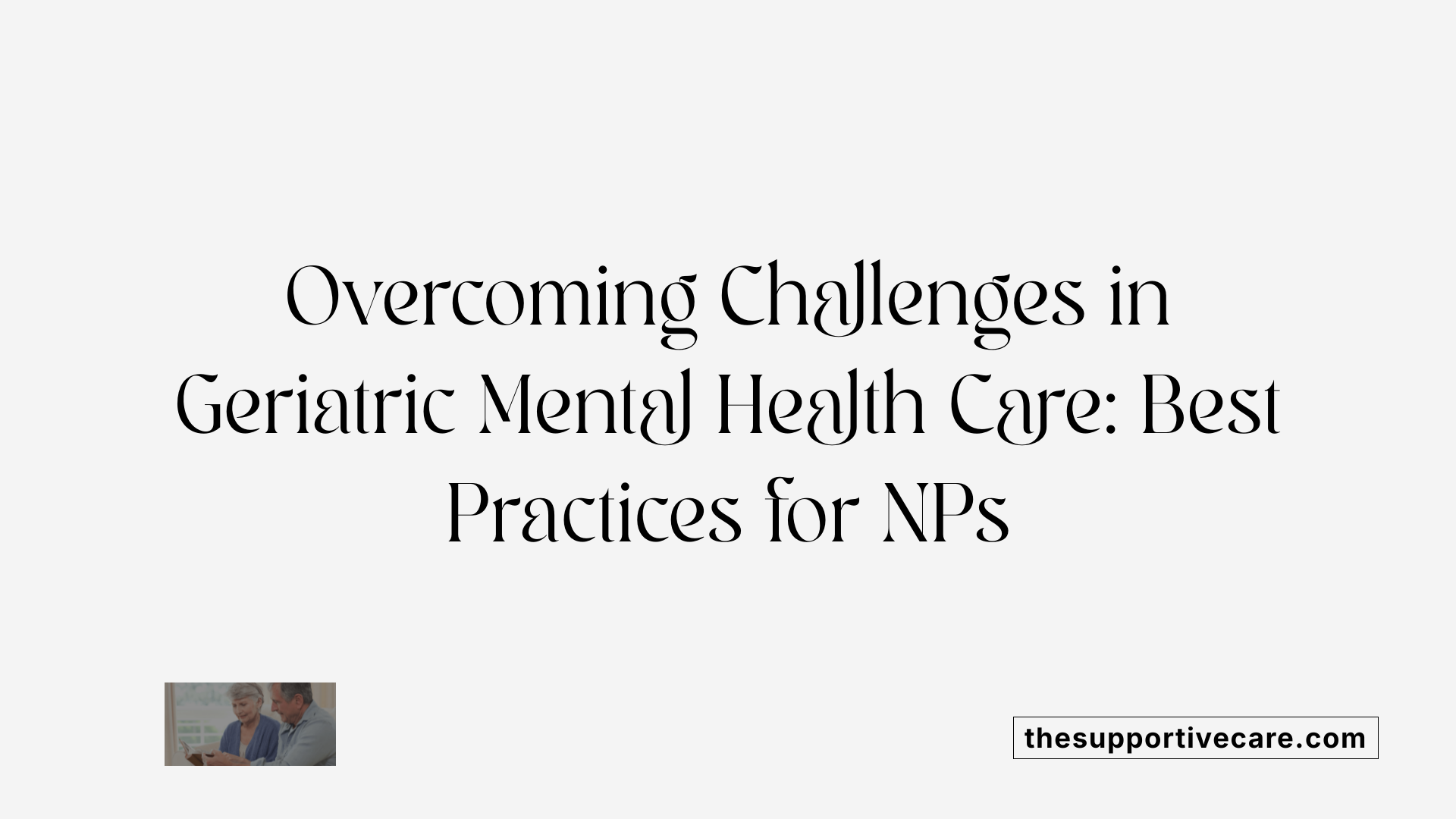
What are the common challenges and best practices for nurse practitioners working with older adults experiencing mental health issues?
Nurse practitioners (NPs) face several hurdles when caring for seniors with mental health concerns. One common issue is role ambiguity, which can lead to uncertainty about their authority and responsibilities in mental health management. Systemic barriers, including limited resources and fragmented healthcare systems, further complicate effective care.
Managing multiple physical and mental health conditions in older adults can be overwhelming. The risk of adverse medication interactions is also significant, necessitating careful medication review and management.
To overcome these challenges, NPs adopt comprehensive assessment strategies that consider social determinants like isolation, housing, and social support. Collaboration with multidisciplinary teams, including mental health specialists, enhances care quality. Regular continuing education ensures they stay updated on geriatric mental health issues.
Incorporating telehealth services can widen access for seniors with mobility issues, while community outreach programs and caregiver involvement increase support. Precise documentation of assessments, treatment plans, and patient responses is essential, not only for continuity of care but also to reduce legal risks.
Addressing societal issues such as stigma and loneliness plays a crucial role in successful mental health interventions. By fostering a trusting environment and actively involving families and caregivers, NPs can significantly improve mental health outcomes for older adults.
Empowering the Future of Geriatric Mental Health Care
As the aging global population continues to grow, the role of nurse practitioners in delivering specialized mental health services becomes increasingly critical. Their advanced clinical skills, holistic approach, and leadership capacity significantly improve access, quality, and outcomes of mental health care for older adults. Overcoming systemic challenges and expanding educational pathways will allow NPs to further enhance their contribution, ultimately transforming geriatric mental health services into more accessible, patient-centered, and effective systems—ensuring dignity and wellness for the elderly in all care settings.
References
- The Vital Role of Nurse Practitioners in Senior Care
- Examining the Contribution of Nurse Practitioners to ...
- What Does an Adult Geriatric Nurse Practitioner Do?
- Training For Geriatric Nurse Practitioners
- The Expanding Role of Nurse Practitioners in Senior Care
- Nurse Practitioners in Primary Care
- Article Involvement of Advanced Practice Nurse in the ...


































































































